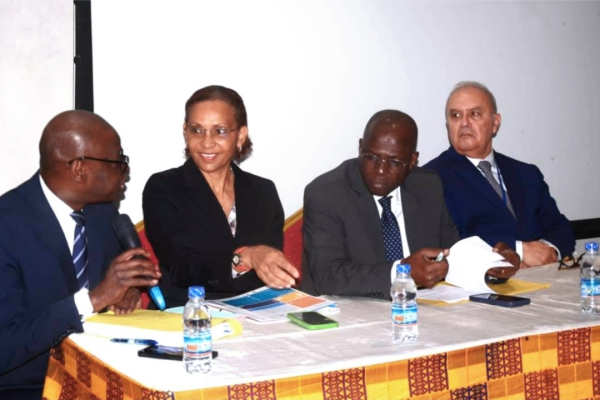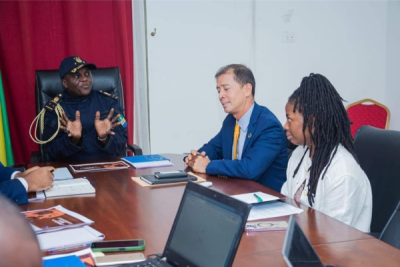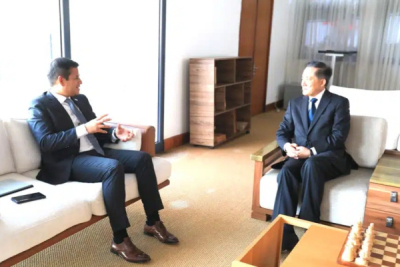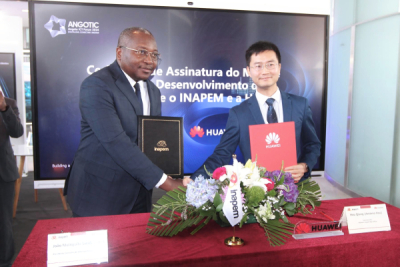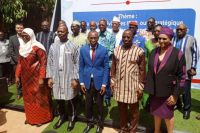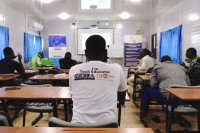The Ivorian government is intensifying its efforts to enhance the employability of young people and women through information and communication technologies (ICT). The goal is to reduce unemployment and stimulate technological innovation in the country.
The United Nations Industrial Development Organization (UNIDO), in partnership with the Ministry of Commerce and Industry and the Ministry of Digital Transition and Digitalization, launched the development of the National Industry 4.0 Strategy in Côte d'Ivoire on Friday, June 14. This initiative was introduced during a dedicated workshop.
The strategy, currently under development, will focus on skill development, support for investment and financing, and assistance to innovation and startup ecosystems to deliver 4.0 technological solutions tailored to business needs. It also emphasizes partnerships, alliances within the ecosystem, international cooperation with technical and financial partners, and awareness-raising efforts.
This initiative is part of the "Employment4Youth: Industry 4.0 to foster youth employment in Tunisia and Côte d'Ivoire" project, led by the Ivorian government and implemented by UNIDO. Launched in 2022, the project aims to increase youth employment and improve working conditions by structuring and consolidating a digital ecosystem, particularly within Industry 4.0. The project is funded by the German Federal Ministry for Economic Cooperation and Development (BMZ) under the special initiative "Decent Employment for a Just Transition."
In Côte d'Ivoire, this project is expected to create 13,000 jobs, including 3,000 direct jobs, by 2025 across various private sectors such as social and ecological transformation, renewable energies, ICT, and agro-industry, with a total investment of USD 30 million.
Samira Njoya
Kenya aims to become a leading technology hub in East Africa. To achieve this goal, the country has secured investment from Poland for its ongoing smart city project, which began in 2012.
Farada Group, a Polish company specializing in unmanned aerial systems (UAS), has announced that it has obtained all necessary documents from the Kenya Civil Aviation Authority (KCAA) to set up a manufacturing plant in Konza Technopolis, Kenya. The goal is to make the country its main hub to serve the African market.
Speaking on the matter, Adam Cudny, President of Farada Group, stated: “We plan to acquire a plot of land here in Konza Technopolis to establish a drone manufacturing company for Kenya and the whole of Africa. [...] We have all the necessary approvals and we have set up a local company to implement the project.”
This Polish investment is part of the state visit of Polish President Andrzej Duda to Kenya in February. The two countries decided to collaborate in various sectors, and Farada Group's leaders, present during the visit, established connections with Kenyan authorities. On this occasion, they donated a drone to the Kenya Wildlife Service (KWS) to help monitor the country’s national parks.
The drones manufactured by the Polish company are used for wildlife surveillance, monitoring power lines, responding to natural disasters (such as floods and wildfires), and delivering essential goods like medical supplies. Additionally, earlier this month, the Korea Eximbank signed two agreements with Kenyan authorities to invest $238 million in Konza Technopolis. The project, once abandoned, has regained momentum in recent years and is central to Kenya’s national development plan, Vision 2030.
Adoni Conrad Quenum
On Friday, June 14, the Minister of Digital Economy and New Information Technologies, General Bonjean Frédérik Mbanza, met with a delegation from the United Nations Development Programme (UNDP) in Gabon. Led by its Resident Representative, Francis James, the UNDP delegation presented the University Pods (UNIPODS) incubator program to the minister. This initiative is established within major public universities across Africa.
Madagascar plans to extend its surveillance camera project beyond the capital, Antananarivo, to other major cities in the country. The initiative was discussed during a meeting between Tahina Razafindramalo, Madagascar’s Minister of Digital Development, Posts, and Telecommunications, and Ji Ping, the Chinese Ambassador to Madagascar, held on Thursday, June 13, at the ministry’s headquarters in Antananarivo. Originally, the project included the installation of 1,200 surveillance cameras in the Malagasy capital.
Angola's National Institute for the Support of Micro, Small, and Medium Enterprises (INAPEM) signed a memorandum of understanding with Chinese tech giant Huawei last week, according to Angola Press Agency on June 14.
The partnership aims to strengthen Angola's national entrepreneurial ecosystem by fostering innovation and supporting the development of startups.
With over a decade of experience across diverse fields, he is passionate about financial inclusion. His goal is to build a world where everyone has equal access to the tools and resources needed for financial empowerment.
Ousmane Seidy Diallo (photo) is an experienced Guinean software developer and tech entrepreneur. He is the founder and CEO of MuduPay, a company revolutionizing the mobile payments sector in Africa and beyond.
Founded in 2021, MuduPay offers an innovative mobile payment platform that simplifies financial transactions in Africa. The solution allows users to make payments, transfer money, and shop online using their mobile phones, even without a traditional bank account. The goal is to include unbanked populations by providing a simple and secure way to manage their finances. With advanced security protocols, MuduPay ensures reliable transactions.
MuduPay also offers two other solutions to meet its clients' needs. The first, MuduBiz, is a business management solution designed for professionals. It includes features such as inventory management, payment processing, and employee management.
The second, MuduExpress, is designed for diaspora members wishing to send money to Africa. It allows for secure and hassle-free money transfers and is available in several countries, including Guinea, Ghana, Nigeria, Senegal, Sierra Leone, Ethiopia, and Côte d'Ivoire.
Ousmane Seidy Diallo holds a degree in network security obtained in 2012 from the American training center Training SOL. After working for three years as a freelance software engineer, he joined the startup eHealth Africa in 2014 as a software developer. In 2018, he became the lead engineer at Ocean Nexus, a software development company.
In 2019, he worked as a consultant at Andela and a software developer at Venzee Technologies, a Canadian company specializing in commerce solutions. He then joined Easer Solar, a company providing renewable energy in West Africa, as chief technology officer.
Melchior Koba
The Congolese government aims to enhance its ability to provide public services tailored to the needs of the population through digital means. This initiative is a key objective of the Digital Transformation Acceleration Project.
On Friday, June 14, Léon Juste Ibombo (photo, center), Congolese Minister of Posts, Telecommunications, and Digital Economy, launched a high-speed internet connection project for public administrations nationwide. The six-month project, valued at €3.2 million (around $3.5
million), is being undertaken by Silicone Connect.
The initial phase will focus on the Ministries of Interior, Posts and Telecommunications, Health, Justice, Social Affairs, and Public Service. It involves installing Wi-Fi access points and implementing digital services.
Minister Ibombo anticipates improved connectivity for civil registry centers within the public service sector. This will strengthen the integrated civil registry system, enabling efficient synchronization and better management of civil data. "Healthcare and Justice sectors will also benefit from increased connectivity in their respective registry centers, hospitals, and courts, ensuring smooth and transparent data management" he added.
This initiative follows the deployment of high-speed internet in Congolese public universities two months prior. It aligns with the Digital Transformation Acceleration Project (PATN). PATN aims to expand high-speed internet access for underserved populations and enhance the government's ability to deliver targeted public services digitally. The World Bank is supporting the $100 million project, with an allocated budget of approximately $64 million for 2024.
By 2025, the Congolese government aims to achieve equitable access to digital services for all citizens. "As digital technology becomes a critical pillar of our development, this project aligns with the President's vision to prepare Congo for a digital, inclusive, and dynamic future the information society," Minister Ibombo declared
Isaac K. Kassouwi
The Burkinabe government aims to accelerate digital transformation and make it a cornerstone of socio-economic development. However, it must first ensure widespread Internet access across the country, including homes, government offices, hospitals, and schools.
On Friday, June 14, Burkina Faso launched high-speed internet connection for nine out of ten higher education and research institutions (HERIs). The $6.2 million project was financed by the World Bank and implemented with the technical assistance of the mobile operator Orange Burkina Faso.
"We provided the Ministry of Higher Education with IT equipment, including Wi-Fi devices installed in the nine HERIs," said Nafy Silué Coulibaly, CEO of Orange. "We also worked to connect the various buildings [174 in total, Ed.] with very high-speed fiber connectivity, and trained 29 engineers who will ensure the monitoring and maintenance of the entire system for the sustainability of the project."
The project launch follows President Ibrahim Traoré's meeting with the academic community in January 2023, which focused on the challenges plaguing the country's universities and education system. The Burkina Faso head of state instructed Adjima Thiombiano, Minister of Higher Education, Research, and Innovation, to equip the country's HERIs with high-speed internet.
According to Mr. Thiombiano, providing high-speed internet in Burkina Faso's public universities will help expand e-learning by facilitating access to online information and educational resources. It will also foster collaboration and knowledge exchange among stakeholders, improve students' digital skills, and stimulate innovation and creativity.
Furthermore, this initiative is part of the digital transformation drive in which the Burkina Faso government is engaged. The government aims to introduce digital technology in all sectors to make it an instrument of societal transformation and socio-economic development.
Isaac K. Kassouwi
As a technological center, its objective is to make digital skills accessible to everyone. Located in northern Benin, the center has already trained thousands of people.
Guerra Tech Hub, an innovative digital center located in Parakou, northern Benin, was founded in 2018 and is led by Vidjinnangni Grégory Thoto, a Beninese entrepreneur and project innovation manager who serves as its president. The hub is dedicated to creating environments that act as catalysts for building the Africa of tomorrow: disruptive, collaborative, and inclusive.
The hub boasts a community of passionate individuals, including developers, designers, and entrepreneurs. It emphasizes practical skill enhancement, collaboration, and problem-solving. Over six years, Guerra Tech Hub has designed and developed several programs, with its flagship initiative being Hack Her_. This program targets unemployed women aged 18 to 30, introducing them to digital professions, technological culture, and coding basics in cohorts of 30.
Other notable programs include Guerra Impulse, Keoubougou Pi, and ImpalaEdTech – Parakou. Guerra Impulse supports entrepreneurs in the creation and development of their business projects. This 12-month program targets early-stage entrepreneurs, selecting five startups or projects per cohort to participate.
Keoubougou Pi aims to inspire young schoolchildren in northern Benin by familiarizing them with computer science, preparing them to become digital citizens. ImpalaEdTech – Parakou seeks to cover all aspects of information and communication technologies (ICT) in education in the long term. The center promotes the teaching and use of ICT in schools and creates job opportunities for young people, especially girls, in the ICT field.
To date, Guerra Tech Hub has trained over 120 young women, more than 500 tech educators, and over 15,000 individuals in northern Benin through its programs. It has also invested over $175,000 in the Beninese tech ecosystem.
Melchior Koba
Named "astonishment" in Bambara, Mali's prevalent language, this education startup lives up to its name by fostering innovation and surprising users with its approach, particularly through its mobile application.
Kabakoo is an edtech solution developed by the Malian startup Kabakoo Academies. Founded in 2019 by Yanick Kemayou and Michèle Traoré, the Bamako-based company offers users access to online training in various fields. The goal is to equip young people with the skills to design and implement solutions tailored to the specific challenges of their communities.
To achieve this, Kabakoo operates physical campuses in several cities across the continent and has launched a mobile application available exclusively on Android. Since its inception, the app has been downloaded over 100,000 times, according to Play Store data. After downloading the app, users can create an account and access the various training programs offered on the platform.
"We connect young people, local communities, and open-minded individuals from around the world to collaboratively solve real-world problems using cutting-edge technologies and indigenous knowledge. The Kabakoo learning experience enables young Africans to acquire the skills necessary to create value by establishing businesses, finding jobs, and overcoming gender inequalities," states the startup.
Kabakoo focuses on a learner-centered curriculum, emphasizing creative project-based learning and the integration of local knowledge. The program is designed to help learners acquire and develop skills in digital fabrication and distributed manufacturing technologies. Its innovative approach has been recognized by numerous institutions, including the African Union, UNESCO, and the World Economic Forum, as a major innovation in the global education landscape.
Adoni Conrad Quenum
More...
Cybercrime is posing a growing threat across Africa, as the continent's rapid digitalization outpaces its cybersecurity preparedness. This vulnerability exposes nations to a range of attacks, from data breaches and financial fraud to more sophisticated assaults on critical infrastructure.
The Nigerien government announced on Wednesday a new ordinance amending Law No. 2019-33 on the repression of cybercrime.
The new ordinance aims to curb the spread of disinformation and online threats , seeking to "strike a balance between freedom of expression and the protection of individual rights, while preserving public peace and security," according to the Ministry of Justice.
Promulgated earlier this month by President Abdourahamane Tiani of the National Council for the Safeguard of the Homeland in Niger, the updated legislation strengthens sanctions for online offenses. Disseminating content that disrupts public order or violates human dignity now carries a potential sentence of two to five years in prison and a fine ranging from two to five million CFA francs (approximately €3,000 to €7,600). Defamation and electronic insults can result in one to three years imprisonment and a similar fine.
Niger, like many African nations, faces a growing problem of cybercrime. During the Digital Week held from April 18 to 20, special emphasis was placed on cybersecurity. On this occasion, the Minister of Communication, Posts, and Digital Economy, Sidi Mohamed Raliou, unveiled the government's ambitions, including the establishment of a National Cybersecurity Center.
By toughening the legislation, the Nigerien government hopes to effectively combat the spread of false information, hate speech, and content inciting violence. This initiative is part of a broader strategy to enhance digital security and protect citizens from growing cyber threats.
Samira Njoya
Five years after the signing of the design protocol, Senegal’s first satellite is ready to be soon be launched into orbit.
GAINDESAT-1A, Senegal's first nanosatellite, is ready for its launch. Successfully integrated into an Exolaunch deployer in the United States, this development was revealed by the Senegalese Space Program (Sensat) on Thursday, June 13, via LinkedIn.
The 10 cm-edged nanosatellite will be launched into space in the coming days aboard a SpaceX Falcon 9 rocket. Its primary mission will be to collect data from state meteorology and water level measurement agencies, which have stations across the country.
Additionally, GAINDESAT-1A will capture satellite images of Senegal using an onboard camera. These images will serve as raw material for future developments. The satellite will take images of the country four times a day for six to seven minutes each time, over a five-year period.
This achievement is the result of a collaboration between the Senegalese government and the Space Center of the University of Montpellier (CSUM), where the satellite was designed and built by Senegalese engineers and technicians. Once in orbit, it will be monitored and controlled from Senegal, using a large control room.
With the launch of GAINDESAT-1A, Senegal will become the second Francophone sub-Saharan country, after Djibouti, to have its own satellite. In Africa, Egypt and South Africa were the first to embark on the space adventure in 1998 and 1999, respectively, followed by a dozen other countries.
Samira Njoya
Intra-African trade is confronted with numerous challenges, particularly regarding the management of goods transportation. To promote the emergence of a common market, it is urgent to identify and overcome existing barriers.
On Thursday, June 13, the Djiboutian Ministry of Infrastructure and Equipment, in collaboration with Djibouti Ports Corridor Road (DPCR) and the European Union, inaugurated a digital fleet management system named "Fleet Management System." This initiative aims to enhance the efficiency of goods transportation between Djibouti and Ethiopia, marking a crucial step for regional trade.
“This modern system will allow us to better plan, manage, and the efficient flow of goods, contributing to our vision of making Djibouti a leading logistics and economic hub in Africa,” stated Aboubaker Omar Hadi, President of the Djibouti Ports and Free Zones Authority (DPFZA).
The launch of this new system is part of a strategic partnership between the European Union and the Republic of Djibouti, supporting the implementation of the Ethiopia-Djibouti Transport Corridor Project. The European Union has invested €32 million in one of the programs aimed at promoting regional economic integration in the Horn of Africa. The objective is to reduce trade costs by 10%, transit times by 15%, and customs clearance times by 30% at certain border crossing points.
The new system, which utilizes radio-frequency identification (RFID) technology, is expected to provide complete and instantaneous control of vehicle routes and transit times along the Djibouti-Ethiopia corridor. This system will also enable all logistics stakeholders to have visibility over truck movements, optimizing logistics operations and reducing waiting times at ports.
Samira Njoya
Togo's Minister of Digital Economy and Digital Transformation launched the Nana Tech Program on Friday, aiming to equip young female entrepreneurs with the skills needed to thrive in the digital age.
The initiative will train participants in digital professions, enabling them to leverage new technologies to enhance their businesses and boost their performance.
"In line with the government’s ambitions, Nana Tech aims to identify and promote female talents in the fields of education and information technologies," said Kafui Ekouhoho, head of the Togo Digital Agency (ATD) and representative for Minister Cina Lawson, at the program's launch.
The "Nana Tech" program draws inspiration from the "Nana Benz," Togolese businesswomen who dominated the textile trade in the 1970s and 80s. "Inspired by this valuable heritage, we aim to perpetuate this culture of excellence in the digital economy by promoting Nanatech," Ekouhoho added.
The program anticipates reaching 1,500 women, empowering them to become key players in Togo's digital transformation.
Support from OMCA
This year, the program is hosted entirely within the Djanta Tech hub, with the Millennium Challenge Account Togo (OMCA-Togo) support as part of its ICT promotion program funded by the MCC's Threshold program.
"The Millennium Challenge Account Togo is honored to work with the digital sector in Togo to accelerate and implement the deep reforms initiated since the beginning of the year," stated Jeanne Ngname Bougonou, Director of OMCA, at the launch of this initiative.
Currently, Nana Tech encompasses five complementary programs:
1. Nana Tech Entrepreneurs: A six-month incubation program for female entrepreneurs, providing support with digital tools.
2. Nana Tech Immersion: An intensive six-day training focused on business management and effective use of digital tools.
3. Nana Tech Ecosystem: Roundtable discussions across the country to strengthen the female entrepreneurial ecosystem.
4. Nana Tech Lab: An online training platform.
5. Nana Tech Talents: A one-month intensive program focused on developing entrepreneurial spirit and digital skills among young startups.
Ayi Renaud Dossavi


